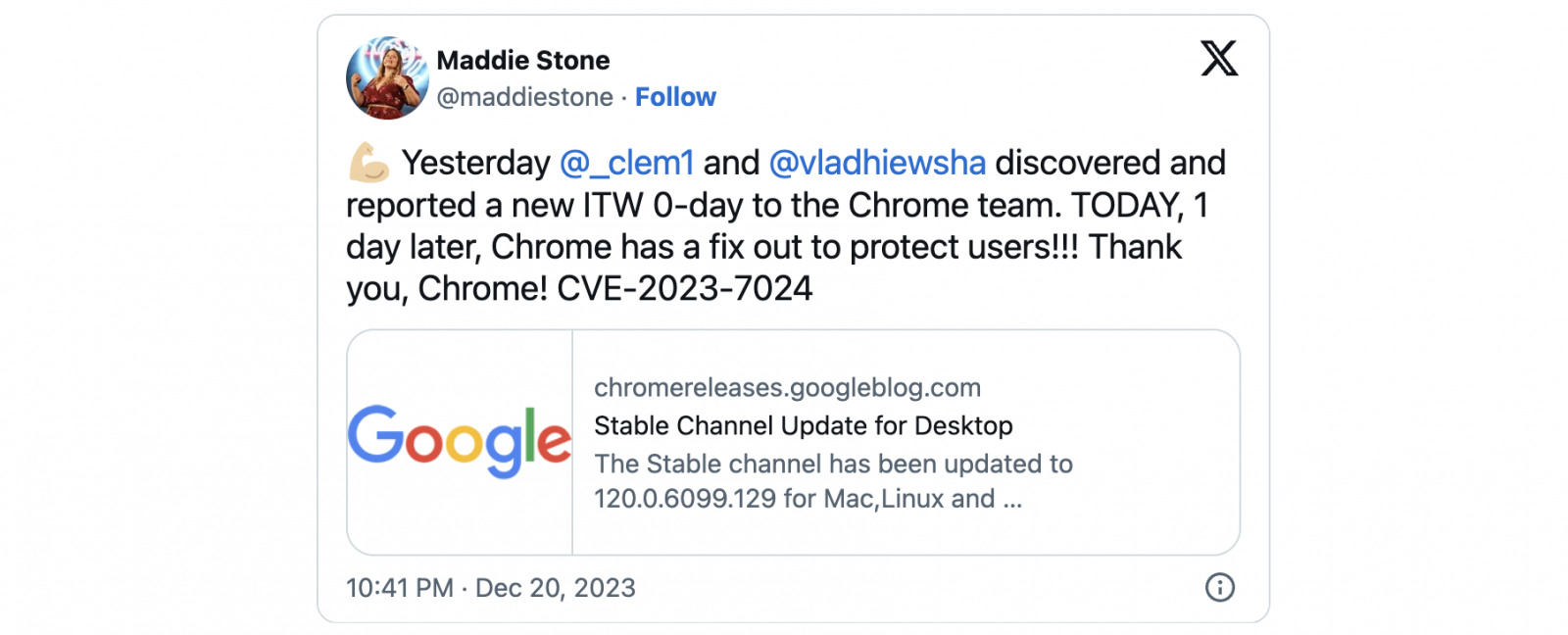
Google has launched emergency updates to repair one other Chrome zero-day vulnerability exploited within the wild, the eighth patched for the reason that begin of the 12 months.
“Google is conscious that an exploit for CVE-2023-7024 exists within the wild,” a safety advisory printed Wednesday stated.
The corporate mounted the zero-day bug for customers within the Secure Desktop channel, with patched variations rolling out worldwide to Home windows customers (120.0.6099.129/130) and Mac and Linux customers (120.0.6099.129) at some point after being reported to Google.
The bug was found and reported by Clément Lecigne and Vlad Stolyarov of Google’s Menace Evaluation Group (TAG), a collective of safety consultants whose main objective is to defend Google clients from state-sponsored assaults.
Google’s Menace Evaluation Group (TAG) continuously discovers zero-day bugs exploited by government-sponsored menace actors in focused assaults aiming to deploy spyware and adware on the units of high-risk people, together with opposition politicians, dissidents, and journalists.
Although the safety replace may take days or even weeks to achieve all customers, in line with Google, it was obtainable instantly when BleepingComputer checked for updates earlier at this time.
People preferring to not replace manually can depend on their internet browser to mechanically examine for brand new updates and set up them upon the following launch.
Eighth Chrome zero-day patched this 12 months
The high-severity zero-day vulnerability (CVE-2023-7024) is because of a heap buffer overflow weak point within the open-source WebRTC framework many different internet browsers, resembling Mozilla Firefox, Safari, and Microsoft Edge, to offer Actual-Time Communications (RTC) capabilities (e.g., video streaming, file sharing, and VoIP telephony) through JavaScript APIs.
Whereas Google is aware of that CVE-2023-7024 was exploited as a zero-day within the wild, it has but to share additional particulars relating to these incidents.
“Entry to bug particulars and hyperlinks could also be stored restricted till a majority of customers are up to date with a repair,” Google stated.
“We will even retain restrictions if the bug exists in a 3rd social gathering library that different tasks equally rely on, however have not but mounted.”
This goals to scale back the probability of menace actors growing their very own CVE-2023-7024 exploits by stopping them from benefiting from newly launched technical info.
Beforehand, Google patched seven different zero-days exploited in assaults, tracked as CVE-2023-6345, CVE-2023-5217, CVE-2023-4863, CVE-2023-3079, CVE-2023-4762, CVE-2023-2136, and CVE-2023-2033.
A few of them, like CVE-2023-4762, have been tagged as zero-day bugs used to deploy spyware and adware weeks after the corporate launched patches.

